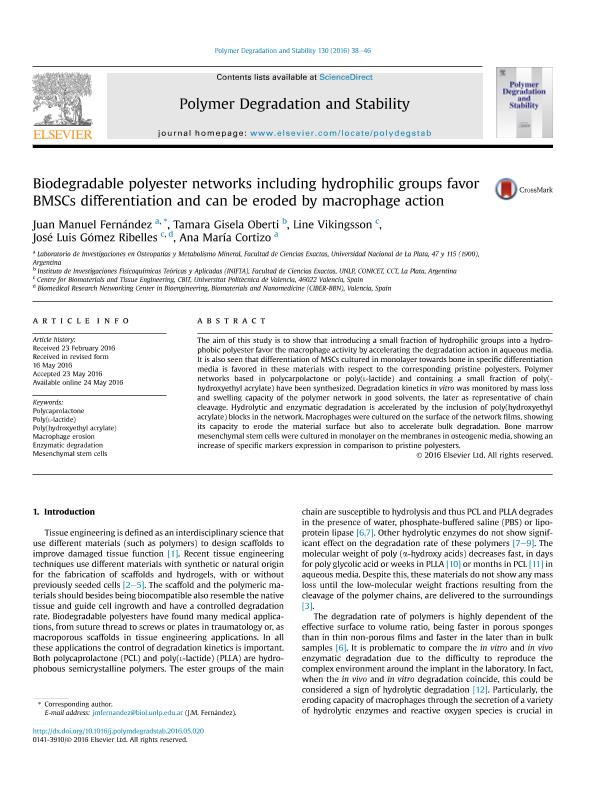Artículo
Biodegradable polyester networks including hydrophilic groups favor BMSCs differentiation and can be eroded by macrophage action
Fernández, Juan Manuel ; Oberti, Tamara Gisela
; Oberti, Tamara Gisela ; Vikingsson, Line; Gómez Ribelles, José Luis; Cortizo, Ana María
; Vikingsson, Line; Gómez Ribelles, José Luis; Cortizo, Ana María
 ; Oberti, Tamara Gisela
; Oberti, Tamara Gisela ; Vikingsson, Line; Gómez Ribelles, José Luis; Cortizo, Ana María
; Vikingsson, Line; Gómez Ribelles, José Luis; Cortizo, Ana María
Fecha de publicación:
08/2016
Editorial:
Elsevier
Revista:
Polymer Degradation And Stability
ISSN:
0141-3910
Idioma:
Inglés
Tipo de recurso:
Artículo publicado
Clasificación temática:
Resumen
The aim of this study is to show that introducing a small fraction of hydrophilic groups into a hydrophobic polyester favor the macrophage activity by accelerating the degradation action in aqueous media. It is also seen that differentiation of MSCs cultured in monolayer towards bone in specific differentiation media is favored in these materials with respect to the corresponding pristine polyesters. Polymer networks based in polycarpolactone or poly(l-lactide) and containing a small fraction of poly(hydroxyethyl acrylate) have been synthesized. Degradation kinetics in vitro was monitored by mass loss and swelling capacity of the polymer network in good solvents, the later as representative of chain cleavage. Hydrolytic and enzymatic degradation is accelerated by the inclusion of poly(hydroxyethyl acrylate) blocks in the network. Macrophages were cultured on the surface of the network films, showing its capacity to erode the material surface but also to accelerate bulk degradation. Bone marrow mesenchymal stem cells were cultured in monolayer on the membranes in osteogenic media, showing an increase of specific markers expression in comparison to pristine polyesters.
Archivos asociados
Licencia
Identificadores
Colecciones
Articulos(CCT - LA PLATA)
Articulos de CTRO.CIENTIFICO TECNOL.CONICET - LA PLATA
Articulos de CTRO.CIENTIFICO TECNOL.CONICET - LA PLATA
Articulos(INIFTA)
Articulos de INST.DE INV.FISICOQUIMICAS TEORICAS Y APLIC.
Articulos de INST.DE INV.FISICOQUIMICAS TEORICAS Y APLIC.
Citación
Fernández, Juan Manuel; Oberti, Tamara Gisela; Vikingsson, Line; Gómez Ribelles, José Luis; Cortizo, Ana María; Biodegradable polyester networks including hydrophilic groups favor BMSCs differentiation and can be eroded by macrophage action; Elsevier; Polymer Degradation And Stability; 130; 8-2016; 38-46
Compartir
Altmétricas



